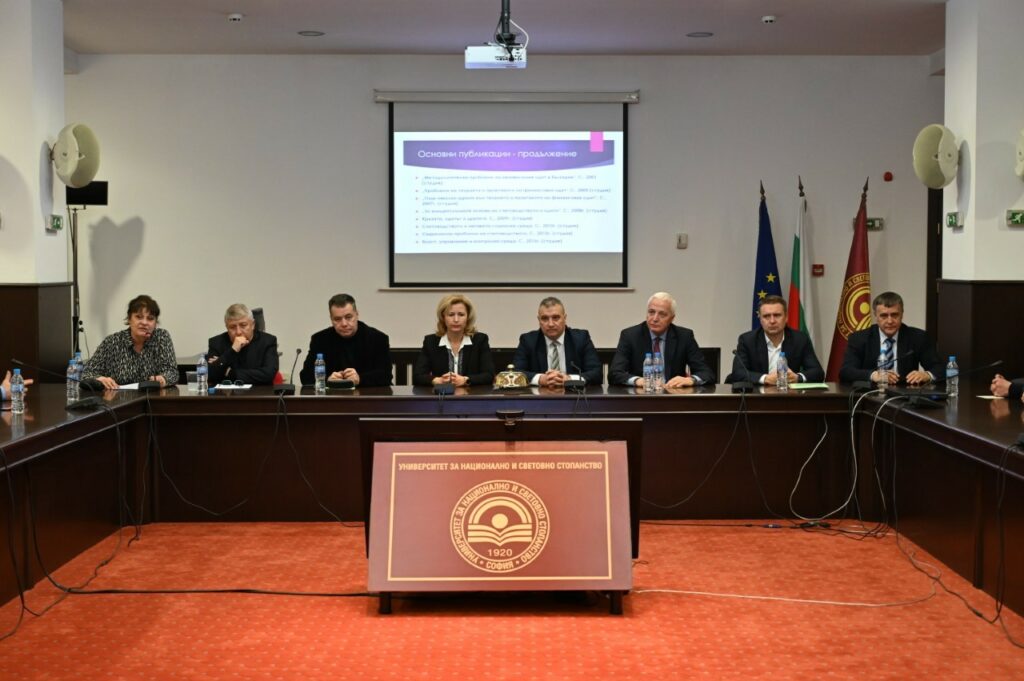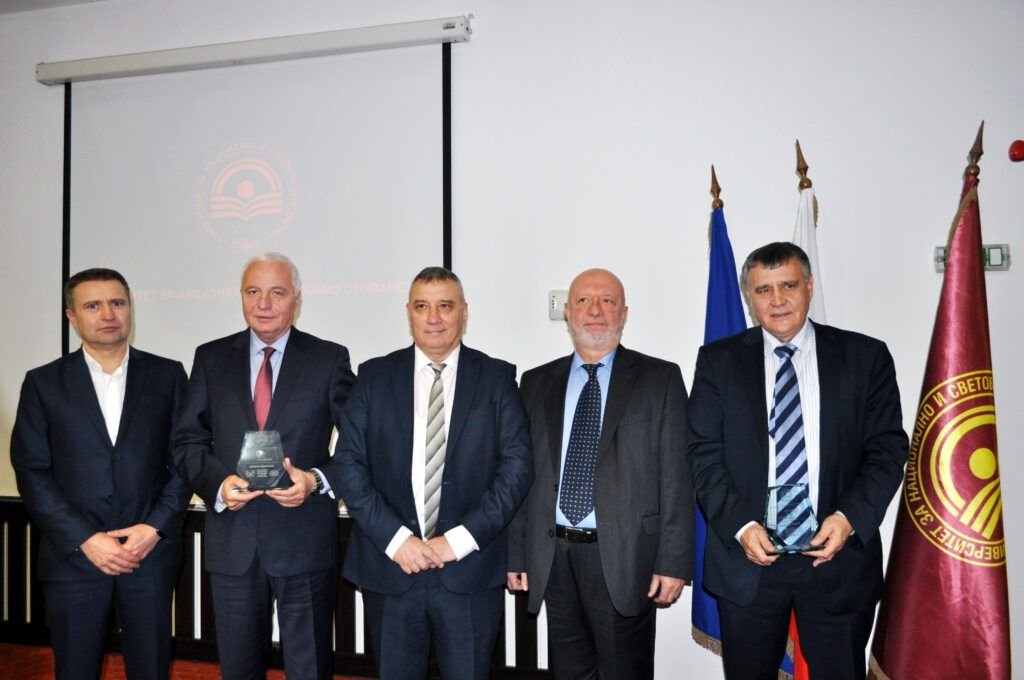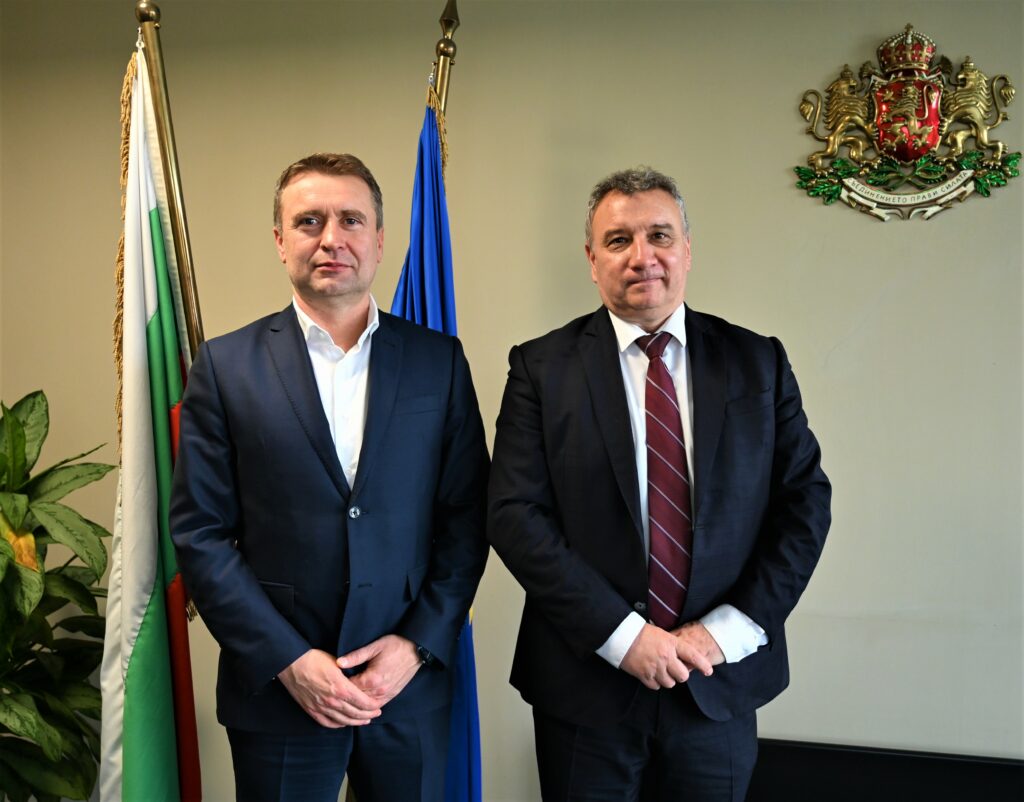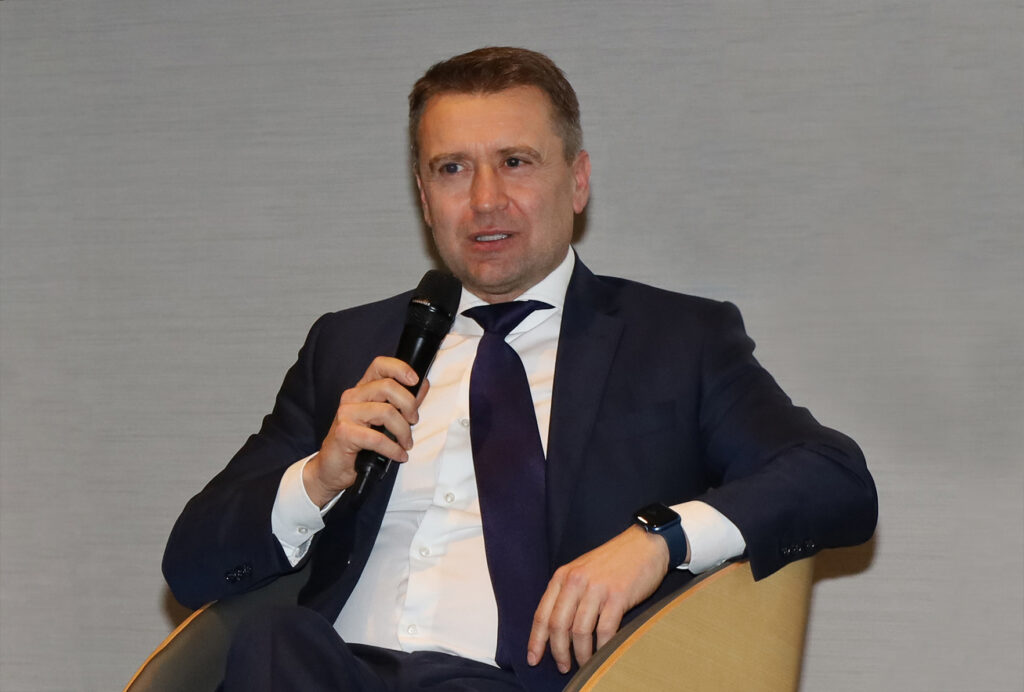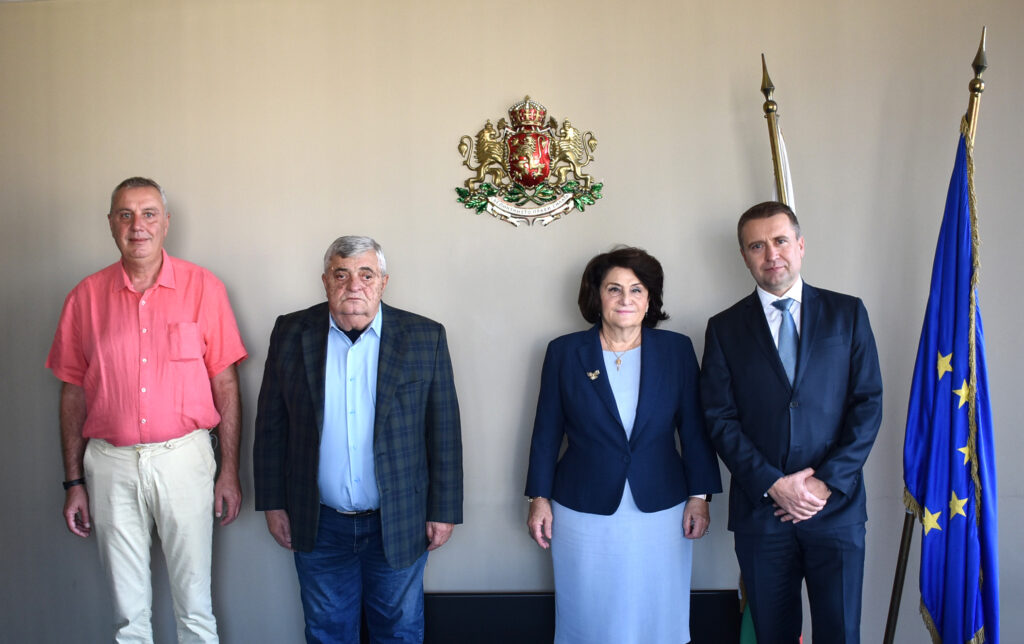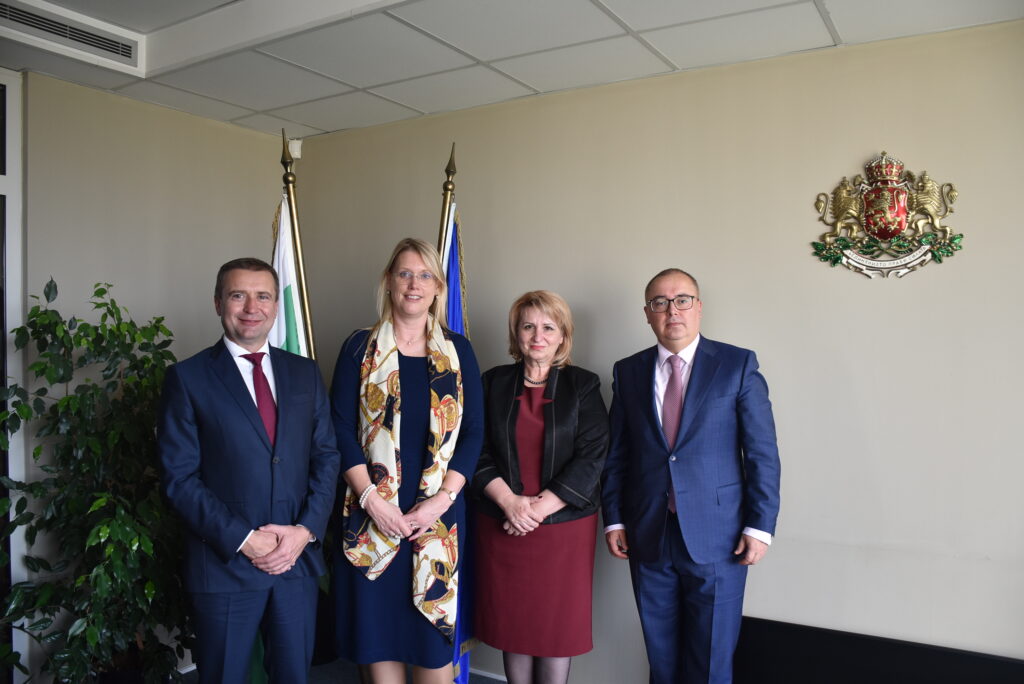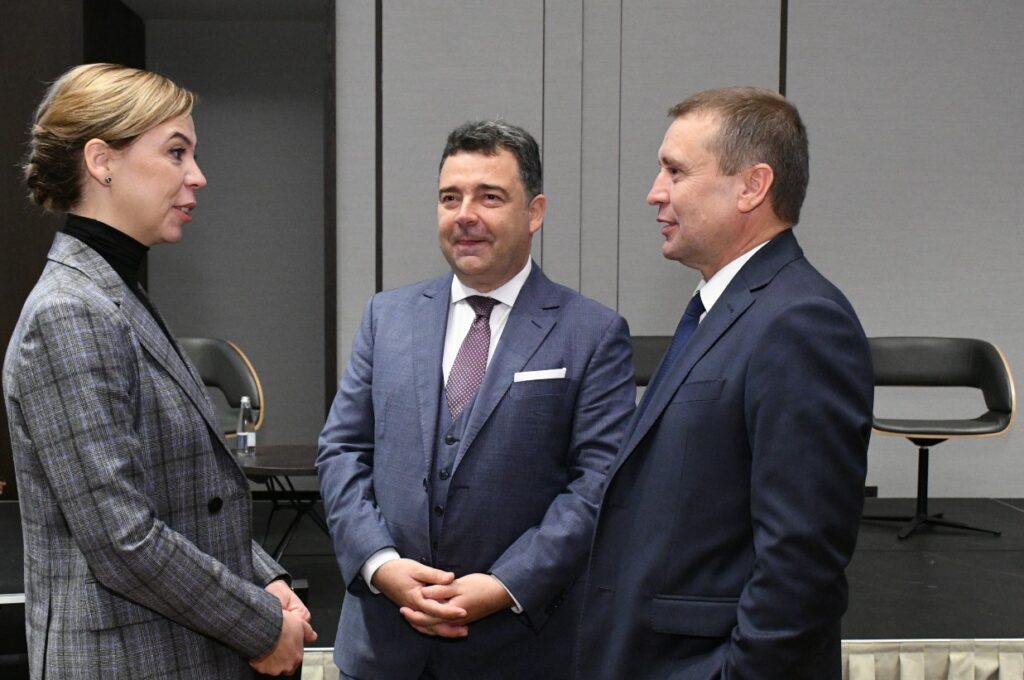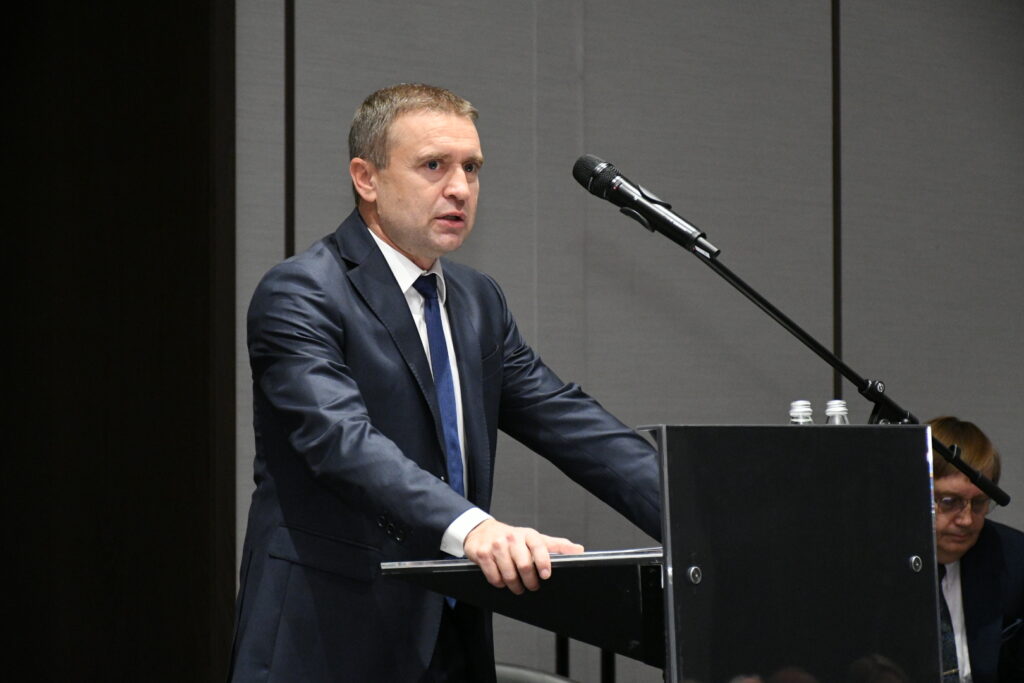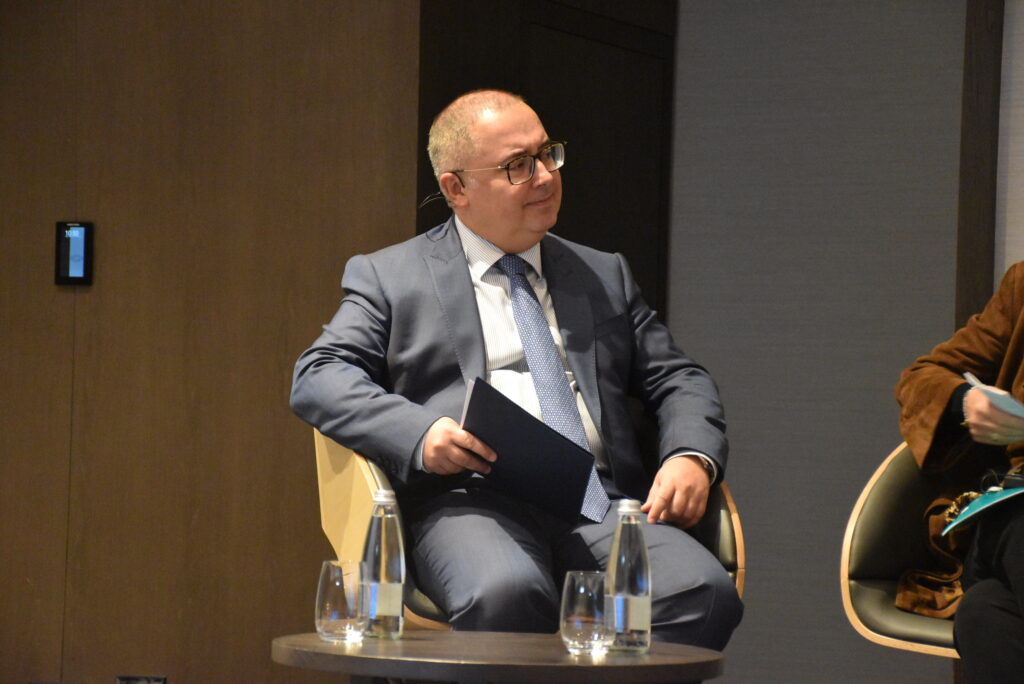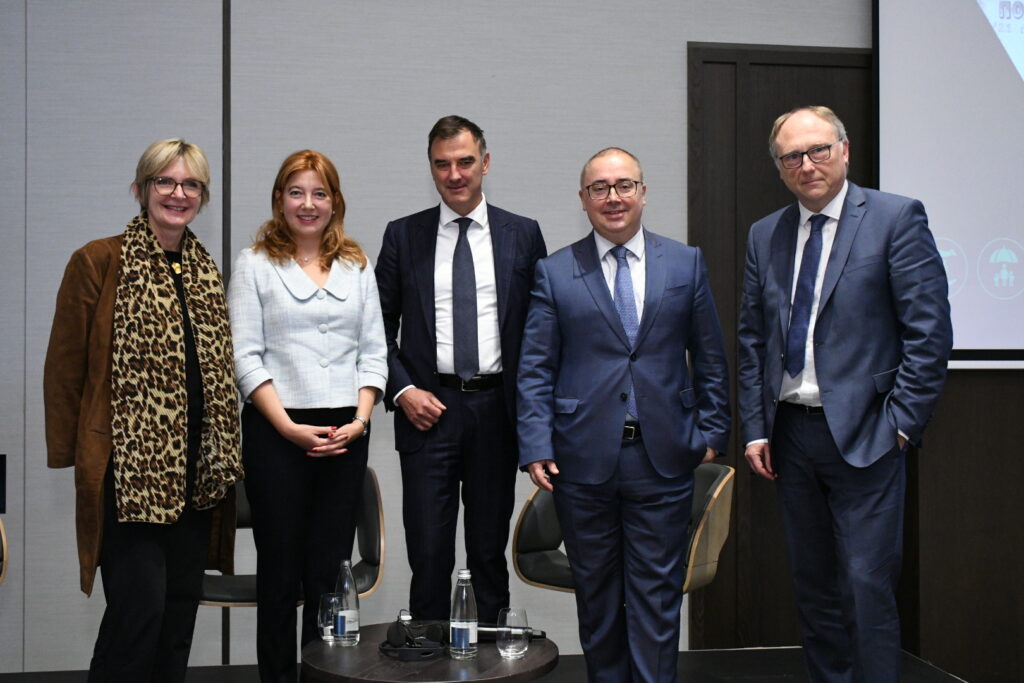You can find the list of the non-licensed Investment intermediaries in the attached file – 07.02.2023
Financial Supervision Commission put on the innovation map
In the “Annual Report of the Bulgarian Fintech Association” (BFA) for the year 2022 dedicated to the most significant fintech achievements, challenges and opportunities, the Bulgarian Fintech Mapping’2022, the progress in the fintech education and the latest fintech regulations in Bulgaria and the EU as well, Mrs. Maria Filipova – Deputy Chair of the Financial Supervision Commission and Head of the “Investment Supervision” Department took part through delivering a speech on the implementation of financial innovations in the non-banking financial sector.
One of the first steps in this direction was the Innovation Hub established by the FSC. It secures a single contact point for submission of proposals, but also for identification of obstacles relevant to the sector, which shortens the time for responding to inquiries received through facilitated communication and data exchange between the interested parties and the regulator.
“We are convinced that an active dialogue among all interested parties lies at the basis for achieving balance between the benefits of the introduction of financial innovations that are applied in the offering of products and services in the non-banking financial sector and ensuring stability and confidence in financial markets and protection of investors’ rights. For this purpose, a working team was created in the Financial Supervision Commission which has to monitor financial innovations in the non-banking financial sector. Its activity is aimed at intensive tracking the benefits and controlling the risks arising from the integration of financial innovations, as well as promoting the dialogue between the regulator and business. In this regard, of main importance are the regular studies and analyzes carried out by the FSC in order to establish the level of innovations used. It is essential to note that such type of studies involve a specially developed methodology for the effective extraction of information, and the results of these studies serve to plan the subsequent and targeted actions“, Mrs. Filipova stressed.
The Financial Supervision Commission declares its readiness to continue its successful cooperation with the business, in sync with the Financial Innovation Monitoring Strategy for the period 2021-2024, which outlines the long-term planned commitments. The regulator will continue to actively work towards the development of financial innovations, by monitoring the development of financial technologies, assessing possible risks for the market and for consumers, and initiating actions and measures to minimize them.
New technologies are changing the non-bank financial sector and the ways in which consumers and companies access services. Moreover, they create opportunities for solutions, which provide better access to finance and improve the financial inclusion of citizens within the digital society. Financial technologies support the operational efficiency and further increase the competitiveness of the economy of the countries in which they are used and contribute to the deepening and expansion of capital markets in the European Union.
Mrs. Filipova’s speech about financial innovations as a way to develop the non-banking financial sector is available here.
To present the report, the BFA organized a conference on “Bulgaria on the European Fintech Map – 2022”. On December 15, the hybrid event brought together leading experts from the world of fintech and presented findings on regulations, fintech education and innovation. Among the panelists, from the University of Sofia, VUZF, the European Commission, etc., was Mr. Vladislav Matev – chief expert in the “Public Companies, Securities Issuers and SPV” department of the Financial Supervision Commission, who presented fintech regulations in the non-banking financial sector.
He emphasized that the activity of the Financial Supervision Commission is fully aligned with the development of financial technologies. As a result of their use, not only the growth of the activity of individual participants in the capital market is expected, but also the transformation of the capital market as a whole.
Mr. Matev outlined the key topics in the fintech sector, such as the adoption of new pan-European regulations including those with direct effect in all member states, which is aimed at accelerating the growth of the single European capital market.
He also drew attention to the strategic goals set for the new business model: facilitating access to the capital markets of emerging and small and medium-sized enterprises; increasing the financial literacy of society; protecting the interests of investors and users of financial services and maintaining the stability of the capital market.
Mr. Matev concluded his participation by saying: “I am convinced that through the ever wider application of financial innovations, the Bulgarian capital market will increase its attractiveness for both local and foreign investors.”
The entire report for 2022 of the Bulgarian FinTech Association is published here.
The Chair of the FSC participated in a round table organized by the UNWE
Right on the birthday of Prof. DrEconSc Mihail Dinev, December 15, a large round table was held – “The work of Prof. DEconSc Mihail Dinev and the future of control” in UNWE.. Assoc. Prof. Dr. Daniela Petrova, head of the Financial Control Department, launched the event by reminding that Prof. Dinev is the founder of the Financial Control Department at UNWE and has great merits for the development of financial control in the country
The Chair of FSC – Boyko Atanasov, was among the official participants in the event, among other professionals distinguished by their contribution to the development of control in Bulgarian institutions: Prof. Ognyan Simeonov, Chair of the Commission for Public Oversight of Statutory Auditors; Boris Mihaylov, Executive Director of the National Revenue Agency; Tsvetan Tsvetkov, Chair of the National Audit Office, Boyko Kostov, Chair of ICPA; Vesela Karaivanova, Deputy Governor of the National Insurance Institute; Prof. Dr. Grigoriy Vazov, president and rector emeritus of the Higher School of Insurance and Finance and many others.
The round table began with acknowledgments to Prof. DrEconSc Mihail Dinev for his undeniable authority as a scientist and expert in his field. The participants in the event also shared memories full of respect for a person who marked the history of UNWE with his remarkable professional experience, brilliant ideas combined with energy, modern thinking and positive approach.
During the discussion dedicated to the new control environment, Mr. Atanasov shared that for him it is the result of the new economic reality. “When the environment changes, we must be keep up in taking control actions, we must be flexible, because our role is above all to protect the public interest. I see the control activity and the work in the Commission not in terms of hibernation, but rather in a proactive strategic position”, he added. The Chair of the FSC pointed out the challenges facing the non-banking sector – alternative investment funds, financial innovations, the Green Deal and the European legislative framework for digitalization, as defining the equation of the new economic reality – they provide new horizons, but also bring new risks.
Mr. Atanasov also commented on the relationship between academia and practice, stating that “the symbiosis between theory and practice is a valuable way of thinking and acting. The new economic realities must predetermine the preparation of young people and provoke the need for new knowledge, and that is precisely why it is important that the cooperation between the FSC and UNWE is based on a two-way sharing of practical experience by experts and the academic environment.”.
Boyko Atanasov, Chair of the FSC, Tsvetan Tsvetkov – Chair of the National Audit Service, Prof. Dr. Dimitar Dimitrov, Rector of UNWE, Prof. Dr. Rumen Brusarski, Dean of the Faculty of Finance and Accounting, UNWE, Boyko Kostov – Chair of ICPA
The commemorative event ended with the presentation of honorary plaques by the Faculty of Finance and Accounting to: Tsvetan Tsvetanov, Chair of the National Audit Service and Boyko Kostov, Chair of the Institute of Chartered Professional Accountants in Bulgaria.
The Chair of the FSC and the rector of UNWE discussed cooperation between the two institutions
The Chair of the Financial Supervision Commission – Boyko Atanasov and the Rector of the University of National and World Economy – Prof. Dr. Dimitar Dimitrov discussed the possibilities for the implementation of an analysis and assessment of the development of the non-banking financial sector until 2030. The study aims to predict and plan how the markets will develop, to help companies to plan their income and expenses, and to find out how regulations affect the insurance sector.
“I believe that a future cooperation between the Financial Supervision Commission and the UNWE will be extremely useful for the research process of preparing analyzes and evaluation of the macroprudential policy for the non-banking financial sector, the determination of national policies and strategies, and will contribute to the economic growth of the country. I am also convinced that our joint efforts and our common commitment will yield an excellent result.” shared Mr. Atanasov.
Prof. Dimitrov, on his part, expressed his belief that the implementation of scientific research, which will be supported by the FSC, will facilitate, enrich and support the professors of the university who are ready to work for its realization.
As a subsequent step in the initiated inter-institutional relations, the Financial Supervision Commission will organize a presentation of the goals and methods for the implementation of the UNWE study to the Bulgarian insurance community.
The Chair of FSC, Boyko Atanasov, participated in a conference on the occasion of Banker’s Day
On December 6, 2022, the Association of Banks in Bulgaria (ABB) gathered prominent representatives of the financial sector on the occasion of Banker’s Day. The official event began with a conference, which was opened by Mrs. Diana Miteva – Chair of the ABB Board of Directors.
The first panel of the conference – moderated by Mrs. Miteva, with participants – Radoslav Milenkov, Deputy Governor of the Bulgarian National Bank, Boyko Atanasov, Chair of the Financial Supervision Commission, Lyudmila Petkova, Deputy Minister of Finance, was dedicated to the new realities – macroeconomic factors and regulatory environment.
The Chair of FSC congratulated the banking community on the occasion, sharing his belief that the banking and non-banking sectors are actually 2 sides of the same coin in the equation of the new economic reality.
“Regulators must place emphasis on those regulations that enable businesses to make informed and ethical decisions in a changing environment. We must create new principles that are relevant in the new reality. The understanding is that the regulators are the anchor of the sailing ship is incorrect, we are the compass that protects it from hitting underwater rocks, we are partners of businesses and investors. My vision for FSC is not one of hibernation, but rather a proactive strategic position in which to look for challenges, both at the macroeconomic level and at the operational business level. I believe that regardless of the new economic reality and geopolitical situation, today we all declare our willingness to work together for the stability and future of the Bulgarian economy, upholding the global digitalization, the European Green Deal and the upcoming entry into the euro area- trends that provoke us to be united in order to be sustainable, on the one hand, and on the other – to boldly face any change,” he stated.
According to him, the biggest challenge is undoubtedly the introduction of the euro, on which the future of the Bulgarian economy and life in the country depends. Leading among other challenges are financial innovations, which can position the capital market at a new level, but also must be carefully introduced. The Chair of FSC also shared that “we ourselves are actively working for the digitalization of the Financial Supervision Commission – reducing the administrative activity for the supervised persons, so that Bulgaria is a place where it is easy to do business”. He announced the launch of a mobile application of the FSC within days, for the convenience of users and supervised persons.
After the adoption of the new regulations, the Financial Supervision Commission will have the important task to create regulatory certainty and increased operational resilience of digital technologies in the financial sector by encouraging the development of innovation, but also by continuing to maintain a secure environment for optimal, but above all secure user experience.
The second panel was dedicated to “Looking ahead – banks and their clients” with the participation of Atanas Pekanov, Acting Deputy Prime Minister for the Management of European Funds, Tsvetanka Mincheva, Deputy Chair of the Board of Directors of ABB and Miroslav Vichev, CEO of Borika AD.
The conference was followed by a celebratory cocktail on the occasion of Banker’s Day.
List of entities which are not authorised by FSC
You can find the list of the non-licensed Investment intermediaries in the attached file – 01.12.2022
The Chair of the FSC, Mr. Boyko Atanasov in a special interview for the newspaper Standard
The challenges facing the FSC are the fintech industry and the adoption of the euro
Boyko Atanasov– Chair of the Financial Supervision Commission
On March 15, 2019, Boyko Atanasov was elected as Chair of the Financial Supervision Commission by the 44th National Assembly of the Republic of Bulgaria.
Mr. Boyko Atanasov was the Deputy Chair of the Financial Supervision Commission, Head of the Investment Supervision Department for the period 2017-2019. He has more than 20 years of professional experience in the revenue administration system – from 2013 to 2017 he was the executive director of the National Revenue Agency.
Mr. Atanasov graduated from the University of National and World Economy, majoring in Planning and Forecasting of Economic Systems and has a number of economic specializations in Bulgaria and abroad.
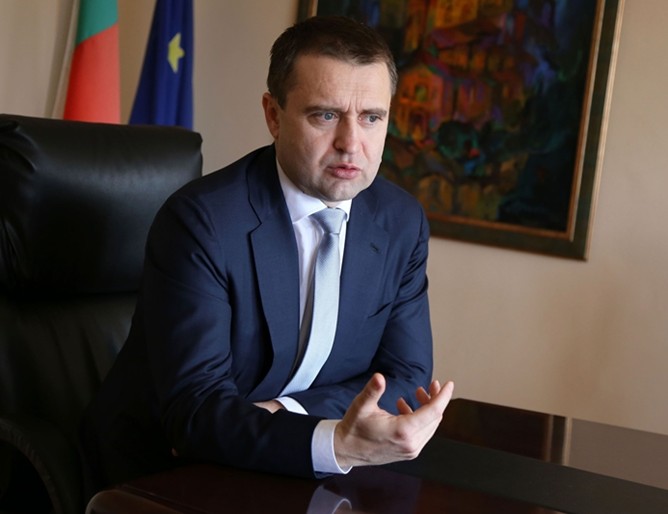
Mr. Atanasov, what „are“ the trends for the development of the non-banking sector in 2023?
In the context of the post-pandemic period, global digitization, the European Green Deal and the preparation of the financial sector for entry into the euro area the Financial Supervision Commission continues to work for sustainable stability of the insurance market in Bulgaria, to introduce innovations in the regulation of the capital market, as well as and for absolute strictness and complete transparency of the actions and processes of the pension insurance market.
- Capital markets
The non-banking financial sector, part of which is the capital market, is an alternative for financing business activities, complementing the opportunities offered by the banking sector. Undoubtedly, one of the most dynamic and rapidly developing sectors of the capital market is the sector of investment funds.
The development of the mutual funds market is essential for both private and corporate investors seeking higher returns. A positive development trend is also emerging in relation to alternative investment funds as a form of collective investment. In recent years, there has been a steady increase in interest in this relatively new subject of the Bulgarian capital market, but with huge opportunities for progress. This type of financing complements bank financing, while alternative investment funds can offer financing for riskier activities. A significant part of them in Bulgaria direct their investment strategies to micro, small and medium-sized enterprises in the form of equity investments and the provision of convertible loans.
I can say that there are increasingly high expectations regarding this significant segment of the fund industry, carrying a huge potential for development and giving requests to become an important factor in the capital market.
- Insurance market
Many of the processes in insurance have already been digitized, including underwriting policies, filing claims, intermediary accountability. Digitization in the field of insurance will continue in the coming years, with the ultimate goal being to offer all products online. Sales through electronic channels will remain stable in both general and life insurance. Digitization will lead to even more personalized products where individuals will compile the risks themselves depending on their individual needs.
It is my view that the question of capital adequacy of insurers will continue to be a leading one in terms of supervision. All of them will have to implement the requirements of IFRS-17, which will present them with new challenges – to reorganize their operations and their systems so as to generate the information and data they need to implement the requirements of the standard.
We are witnessing all the preconditions that in the coming years the insurance market will continue to develop with new products related to both cyber risks that need insurance coverage and products concerning the impact of the climate on various activities and especially on agriculture.
- Social insurance market
The regulatory policy carried out by the FSC regarding the activity of supplementary pension insurance is already 20 years old, and the sector has undergone remarkable development, especially in the last three years. Currently, the investment portfolios of the pension funds are well structured and highly diversified, with adequate reserves to guarantee the payment of lifetime pensions. The assets of the pension funds are subject to daily inspection by the Financial Supervision Commission, in its capacity as a specialized supervisory body. I can say that the activity of supplementary pension insurance is one of the most strictly regulated in our economy.
Just a few days ago, a change in the Social Security Code was passed by the parliamentary social committee, which will allow Bulgaria to introduce the so-called Pan-European Pension Product , which is commonly called a “European pension”. Through this product, Bulgarian citizens will have the opportunity to voluntarily provide for an additional pension within the EU, even if they change their residence from country to country, without administrative or financial inconveniences. They will also have access to many more pension products developed by European companies and will be able to choose higher-yielding but riskier or more conservative schemes. In this way, funds from other countries in the European Union will be able to operate on the Bulgarian market and pay additional pensions to people who are voluntarily insured in them as part of the third insurance pillar.
What are the strategic goals that the Commission sets for itself?
The FSC has entered a new strategic period covering the period from 2022 to 2024. The regulator’s development strategy includes a clearly defined long-term development vision supported by a strong expert team and maximum deployment of digitization processes in the non-banking sector. All this will be accompanied by constructive dialogue with all stakeholders in the processes regulated by the FSC. An important part of the development of the Bulgarian capital, insurance and social insurance market is the active and effective discussion with businesses in the direction of developing concepts and sustainable strategies. Our goal is to be predictable in our actions and to show objectivity when making decisions on which the development of Bulgaria depends.
In order to achieve results in accordance with the set development strategy, the Financial Supervision Commission has passed and will continue its course through specific steps such as the development of financial literacy of users of financial services and investors, increasing the scope of the communication process by conducting regular meetings with FinTech companies to discuss minimal risks and maximum benefits from technologies, promoting the development of start-up companies by activating the capabilities of the Innovative Hub, as well as adapting the new regulatory framework for crowdfunding. Together with the participants in the non-banking financial sector, we create a sustainable and innovation-friendly business environment, with an emphasis on the need for a partnership between the national regulator and business.
The already functioning Innovation Hub provides a single point of contact for interaction between us as a supervisory authority and the respective FinTech companies. Thanks to the introduced digital innovation, persons supervised by the Financial Supervision Commission and FinTech companies can count on assistance when they need clarification on the regulations or when applying for a permit for their activities.
Can we talk about digitization of the non-banking financial sector and what is the role of the FSC?
Technological advances already offer the financial sector tremendous opportunities to meet growing customer needs and regulatory requirements. Increasingly, staying competitive will mean that financial market participants stay abreast of the latest developments in fintech so that companies can ensure they are taking advantage of the best possible technology solutions.
I believe that we, as a regulatory and supervisory body of the insurance, investment and social insurance market, are already and will be observers of the innovation implementation process in order to know in detail how they work and are implemented. The goal is to ensure adequate evaluation of new product and business models. We also have a responsibility to balance the risks of innovations against the benefits to consumers; we also need to find the balance between encouraging innovation and protecting customers from potential downsides.
We will need to assess and where appropriate, adjust the regulatory framework, especially on the part of market behavior, in order to adequately deal with changing risks and business models. We also face the task of having the capacity to be able to react and supervise FinTech solutions in the future.
Last but not least, the Commission is already working on its digital transformation project to meet the needs of supervised persons so that all administrative services can take place in a digital environment. The result will be time saved for businesses and citizens. According to a report by the International Monetary Fund (IMF), for example, the level of development of e-government correlates with the level of foreign direct investment. The easier it is to do business in a country, the more companies want to invest in it. We hope that, as cause and effect, this will also stimulate the entry of new participants in the capital markets.
In response to the changing environment, the Commission is using also social networks as additional communication channels to meet the new challenges of its goal of financially literate consumers of financial services. At the end of 2021, our digital campaign #invest safely was launched. In 2022, we renewed the design and content of the website of the Financial Supervision Commission, and in a few days we will present the institution’s mobile application – FSC Mobile. With it, users will have access to the Commission’s database of licensed investment firms, insurers and pension insurance companies, they will be able to check in real time the status of the digital complaint they have submitted, contact us directly, and view important dates from the supervisiom calendar.
What are the challenges you expect to face in the upcoming year?
The Financial Supervision Commission faces several main topics in the current and coming period: the development of the fintech industry and the crypto asset market, the adoption of the euro as the national currency, as well as the active protection of consumers. The FCS is a major participant in the process of creating the National Plan for the Introduction of the Euro in Bulgaria. The Commission’s vision for this key process for the Bulgarian economy includes the systematization of the necessary measures and actions in connection with the conversion of financial instruments. We intend to carry out the necessary monitoring of the expected stages for the adaptation of the clearing and settlement systems to work with the euro.
And most importantly for me, the Financial Supervision Commission remains fully focused on its main priorities: to protect consumers of financial services, to maintain the stability of the non-banking financial sector and to promote the development of the insurance, investment and social insurance sectors.
The Chair of the Financial Supervision Commission – Boyko Atanasov launched the 20th anniversary edition of the educational program for students “The non-banking financial sector in Bulgaria”
On October 21, Mr. Boyko Atanasov – Chair of the Financial Supervision Commission (FSC) opened the 20th edition of the educational program for students “The non-banking financial sector in Bulgaria”. The traditional initiative is organized in partnership with the Ministry of Education and Science (MES) and the Atanas Burov Foundation. In the anniversary edition of the event, 22 students from vocational schools with an economic and financial profile from the cities of Blagoevgrad, Gorna Oryahovitsa, Varna, Kyustendil, Plovdiv, Sofia, Burgas, Stara Zagora, Veliko Tarnovo, Shumen, Gotse Delchev, Sliven, Smolyan will take part. , Montana, Silistra, Petrich, Kardzhali, Ruse, Varna, Yambol and Dryanovo.
The educational program is unique in Bulgaria. In its anniversary edition, it presents a balanced content between online-based presentations and virtual interactions, dedicated to the pension insurance, insurance and capital market, with speakers – FSC experts and business representatives.
“I am honored to launch the 20th anniversary edition of the program, the focus of which is to increase the financial literacy of society. The sustainability of the program, its 20-year history, speaks of consistency, of commitment and, above all, of our responsibility to the generation that grows and is educated in the challenging environment of digitization and innovation.” shared Mr. Atanasov.
During the training, students and their teachers will learn about the three-pillar model of pension insurance, the development of the insurance market in Bulgaria, the mechanisms for consumer protection, the types of insurance and insurance supervision. The capital market and stock exchange trading are also part of the program during which the topic of the digital field of safe investing is presented, as well as the ways in which investors are protected.
To make the content even richer and more comprehensive, in sync with the latest trends in the non-banking financial sector, in 2022, lectures on fintech business models, prevention of money laundering and terrorist financing, the “green deal”, cyber security and cryptocurrencies and more.
“I believe that the shared experience of the experts with whom you will work will help you to be more responsible for your finances, to be drivers of change, but above all with the awareness of financial culture, to have the confidence and courage to pursue your dreams you are.” said Mr. Boyko Atanasov in his address to the participants.
The program continues until the middle of November, when all students will receive a certificate for their participation in the educational initiative.
The management body of the Financial Supervision Commission hosted an official meeting with the Chairperson of the European Insurance and Occupational Pensions Authority (EIOPA)
The Chairperson of the Financial Supervision Commission (FSC) Mr. Boyko Atanasov, as well as its Vice Chair in charge of the Insurance Supervision Division Mr. Vladimir Savov and the Vice Chair in charge of the Social Insurance Supervision Division Ms. Diana Yordanova held an official meeting with the Chairperson of EIOPA Ms. Petra Hielkema.
During the meeting, they discussed the strategic priorities in two main aspects of the non-banking sector, namely the insurance and the pension insurance area. The FSC management body emphasized its readiness to cooperate with EIOPA within the framework of various committees, working groups, as well as when attempting to achieve common goals in order to secure financial stability in both the insurance and pension insurance area.
The FSC management body expressed its gratitude to the European institution for its continuous efforts aimed at boosting the expertise of the national regulators. Due to its specialized trainings, the FSC officers will continue with their participations in various events organized by EIOPA which are meant to improve and enlarge their supervisory capacity.
Both institutions agreed upon their joint priorities set by them, namely digitalization, sustainable finance, effective cooperation at the EU level, financial innovations and consumers’ protection, as well as their synchronized functioning aimed at achieving stronger convergence in the EU, as regards the specified issues.
On its part, EIOPA emphasized its preparedness to support the national regulators, more precisely the FSC needs, and to facilitate the achievement of the common EU priorities. Both authorities agreed on the concept that the forthcoming new legislation dedicated to the Solvency II review, the future insurance recovery and resolution framework (IRRD), the digitalization and the sustainable finance poses a new challenge, which has to be met based on the developed partnership.
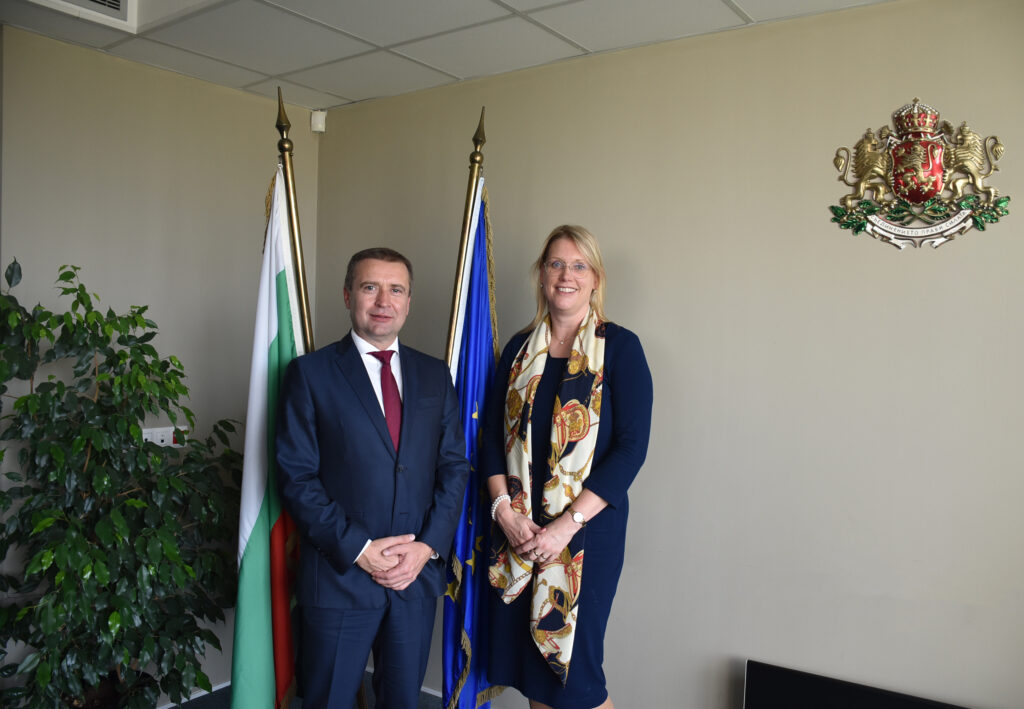
“In 2022 the FSC commenced a new strategic period. In the course of it, we shall continue to be of consumers’ use through effective communication, unbiased decisions and foreseeable actions. Our present-day meeting makes us more self-confident due to the successful partnership with EIOPA and the shared professional experiences” pointed out Mr. Boyko Atanasov.
The Chair of the Financial Supervisory Service, Boyko Atanasov, opened the anniversary conference “140 years of Bulgarian insurance”
On October 5, 2022, in the presence of officials and guests, an anniversary conference was held on the occasion of 140 years since the beginning of insurance in Bulgaria and 30 years since the establishment of the Association of Bulgarian Insurers (ABI). The prestigious event is organized by ABI, a long-standing partner of the Financial Supervision Commission (FSC).
The conference was opened by Mr. Konstantin Velev – Chair of the Board of ABI, Mrs. Daniela Dobreva – Deputy Minister of Finance and Mr. Boyko Atanasov – Chair of the Financial Supervision Commission. Leading figures of European insurance were also present – Mrs. Petra Hielkema, President of the European Insurance and Occupational Pensions Authority (EIOPA), Michaela Köhler – Director General of the European Federation of Insurers Insurance Europe and Didier Millero – Head of the Insurance and pension insurance Sector in the Directorate General “Financial Stability, Financial Services and Capital Markets Union” of the European Commission.
Mr. Velev set the highlights of the conference – regulations, competitiveness and the growing climatic, demographic and digital risks of the modern age, as well as the search for appropriate protection against them.
In her speech, the Deputy Minister of Finance – Ms. Daniela Dobreva emphasized the successful partnership of the Ministry of Finance with the FSC and the ABI, as “the goal is to increase the protection of users of insurance services, guarantee financial stability and preserve the competitiveness of Bulgarian insurers”.
The Chair of the FCS – Mr. Boyko Atanasov welcomed the participants and shared that “the role of the Association of Bulgarian Insurers is to be a pillar of security, a balancer for diplomacy, a visionary for conquering new horizons. I believe that the words that best describe our joint work with the insurance sector in Bulgaria are dialogue, technological orientation and cause”.
The Financial Supervision Commission will continue to support the insurance industry and work to achieve a smooth implementation of the new regulations affecting this sector in the country. As of the first half of the year, it represented 3.9% of GDP calculated on the basis of gross premium income (insurance penetration), and 8.2% calculated on the basis of insurers’ assets (2021 data). For the first six months of 2022, Bulgarian insurers realized gross premium income in the amount of BGN 1.7 billion, taking into account an increase in written premiums of 11%, and for the same period benefits were paid in a total amount of BGN 684 million , with the same growing by 10% on an annual basis.
The cited data are an indicator of a stable insurance market, which is a prerequisite for a higher level of competitiveness and at the same time for maintaining confidence in it. Innovation is about to be created and introduced, with the potential to position insurance companies and their customers at another level.
During the conference, Mr. Vladimir Savov, Deputy Chair of the FSC, Head of the Insurance Supervision Department, took part in the discussion part of the panel “Insurance Market: Regulations and Competitiveness – in Search of the Balance”. Topics fundamental to insurance were discussed and effective policies were outlined to stimulate the development of the sector, with all the resulting benefits for the economy and society.
